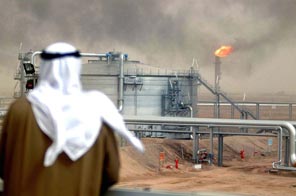Mideast oil exporters' foreign reserves to rise in 2010
DUBAI: Oil exporters in the Middle East and North Africa region are expected to increase their international reserves by over 100 billion dollars in 2010 as oil prices rebound, the IMF said on Sunday.
The rebuilding of reserves will help governments of the region maintain public spending, which has mitigated the impact of the global financial turmoil on their economies, the International Monetary Fund said in report released in Dubai.
"With higher oil prices and the anticipated re-emergence of global demand, oil revenues are expected to increase, allowing oil exporters to rebuild their international reserve positions by over 100 billion dollars in 2010," the Middle East and Central Asia Regional Economic Outlook said.
Oil exporters -- Algeria, Bahrain, Iran, Iraq, Kuwait, Libya, Oman, Qatar, Saudi Arabia, Sudan, United Arab Emirates and Yemen -- have suffered as oil prices dropped to near 30 dollars per barrel around the turn of the year from an all-time high of 147 dollars per barrel in July 2008.
As a result, the current account surplus of these countries dropped by nearly 350 billion dollars.
Since then, the price of oil has rebounded to around 70 dollars per barrel.
"The use of reserve buffers for countercyclical spending by oil exporters mitigated the impact on their own economies and generated positive spillovers for their neighbours," IMF Middle East and Central Asia department director Masood Ahmed said in a press release.
The IMF projects that the economies of all countries of the Middle East and North Africa in addition to Afghanistan and Pakistan are expected to grow 4.0 percent in 2010.
Gulf Arab economic growth is expected to slow to 0.7 percent in 2009 from 6.4 percent in 2008 but rise to 5.2 percent next year, the IMF said.
The driver of such growth will be oil production in oil-rich countries, while public spending will play a large role, Ahmed told AFP in an interview after the report was released.
"Public spending is a big driver as well as private partnerships once the private sector starts to borrow and that would have a spillover effect on the economy," he said. "The return of capital flows would help."
Saudi Arabia, for example, has maintained high levels of spending on infrastructure, education, social investment and education, Ahmed said.
Ahmed also said that the Gulf region's sovereign wealth funds will continue to invest at home and abroad and will seek to diversify their holdings.
"SWFs have played the role of the long-term investor," he said. "So as the reserves of these countries increase, this will be reflected (in the SWFs) as some of those reserves will be managed by sovereign wealth funds. It's a natural process."
The IMF report said that the impact of the crisis in the region is most visible in the oil sector, where output is projected to contract by 3.5 percent in 2009.
The IMF based its forecasts on an oil price of 77 dollars per barrel based on prices in the futures market, Ahmed said.
"The MENAP (Middle East, North Africa, Afghanistan and Pakistan) oil exporters were directly affected by the global financial crisis through a sharp drop in oil prices, a contraction in the global economy, and a sudden drying up of capital inflows," the report said.
Oil importers' economic growth will slow to 3.6 percent this year from 5 percent in the previous year but the report said that they will be straddled by high debt levels that would limit the space for fiscal stimulus.
The fund also said that strengthening financial regulation and supervision is crucial to cushioning the financial system against future shocks.
The IMF recommended that these oil importers act to boost private sector activity, create jobs and strengthen competitiveness.






